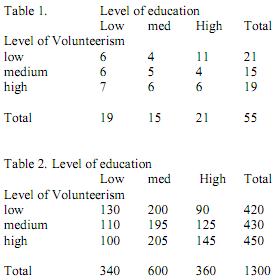1) Two researchers are interested in examining the relationship between level of education and level of volunteerism in Canada. The organization is interested in knowing whether or not the two variables are associated (i.e. does level of volunteerism vary by level of education)? The results are presented below.
Researcher A has produced Table 1 and Researcher B has produced Table 2. The researchers present the results below, which in a sense, appear to be a bit contradictory.

1a. For Researcher A, on the basis of the above, what can you tell me about the nature (strength and direction) of this relationship? Use the appropriate measure of association given the level of measurement involved. Is this relationship significant?
1b. Similarly, for Researcher B, what can you tell me about the nature (strength and direction) of this relationship?
Is this relationship significant?
1c. Are the results consistent? Why or why not?
1d. On the basis of the above, what would you recommend to the researchers. Is there a positive or negative relationship between the two variables? Who is most likely to volunteer in Canada (persons who have low or high level of education?)
2. A researcher randomly sampled 12 Canadian inmates in a Federal Prison in order to document the relationship between ‘education and length of sentence". The initial hunch of the researcher was that less educated criminals are more likely to have longer sentences than better educated criminals.
2a. Using the following data, what can you tell me about the direction, strength and significance of this association?
2b. Using the regression results, how long a sentence would you predict for an inmate with only 5 years of formal education? What would you expect for somebody without any formal education whatsoever?